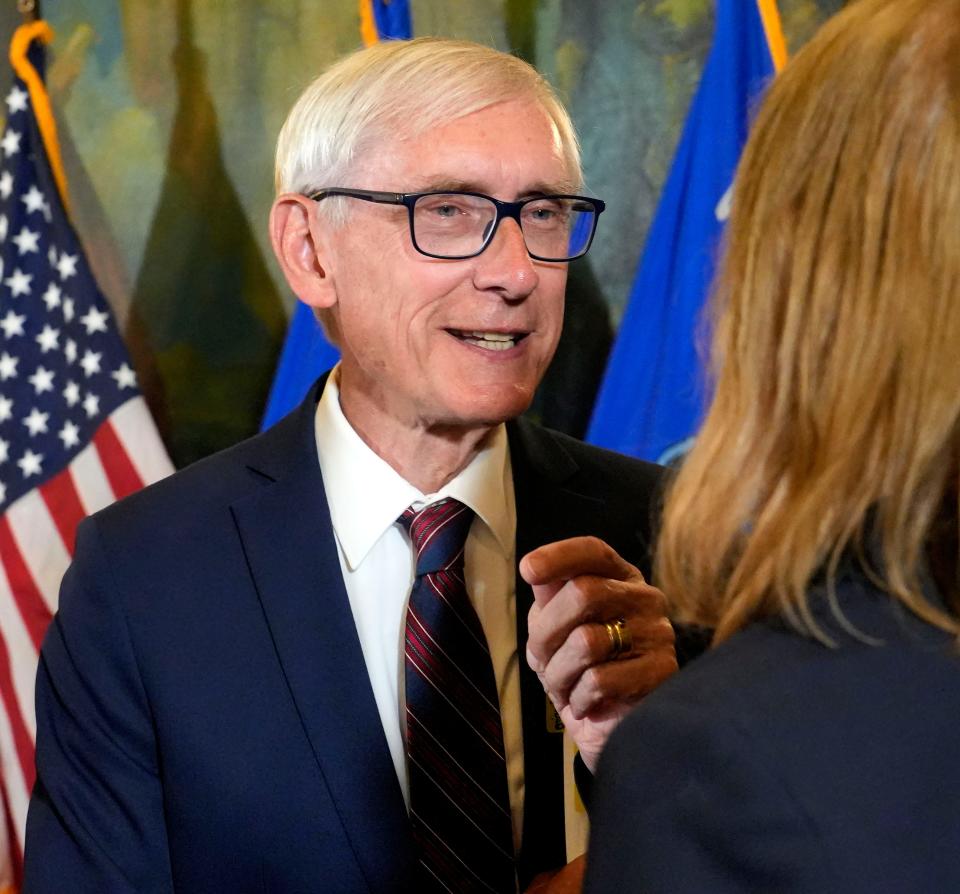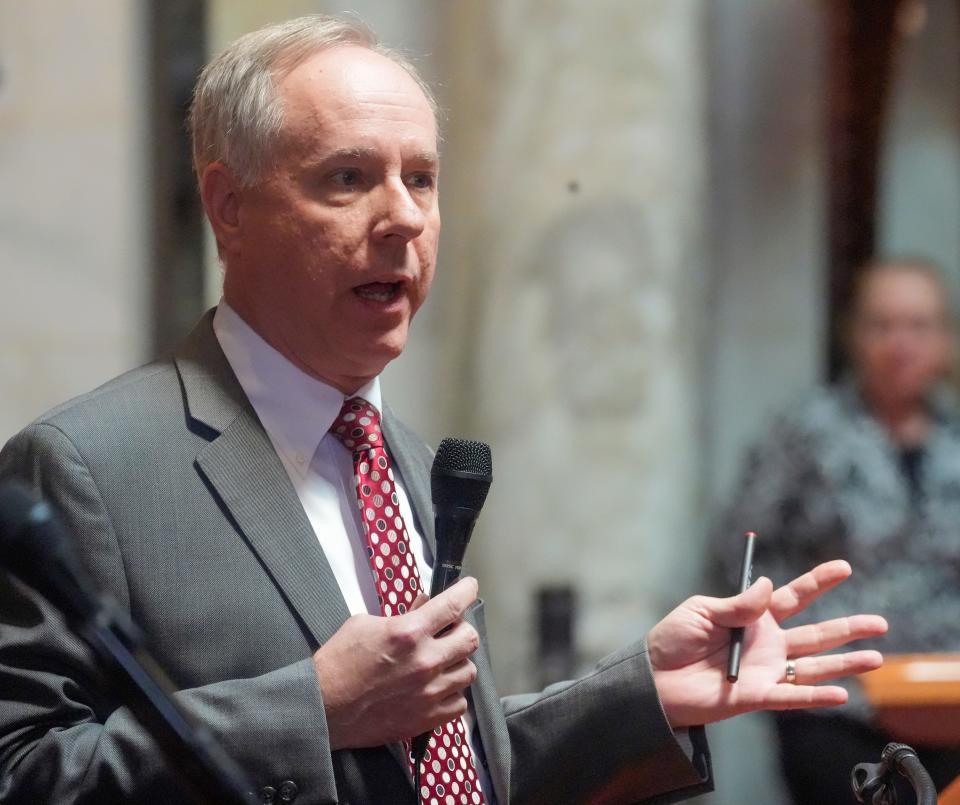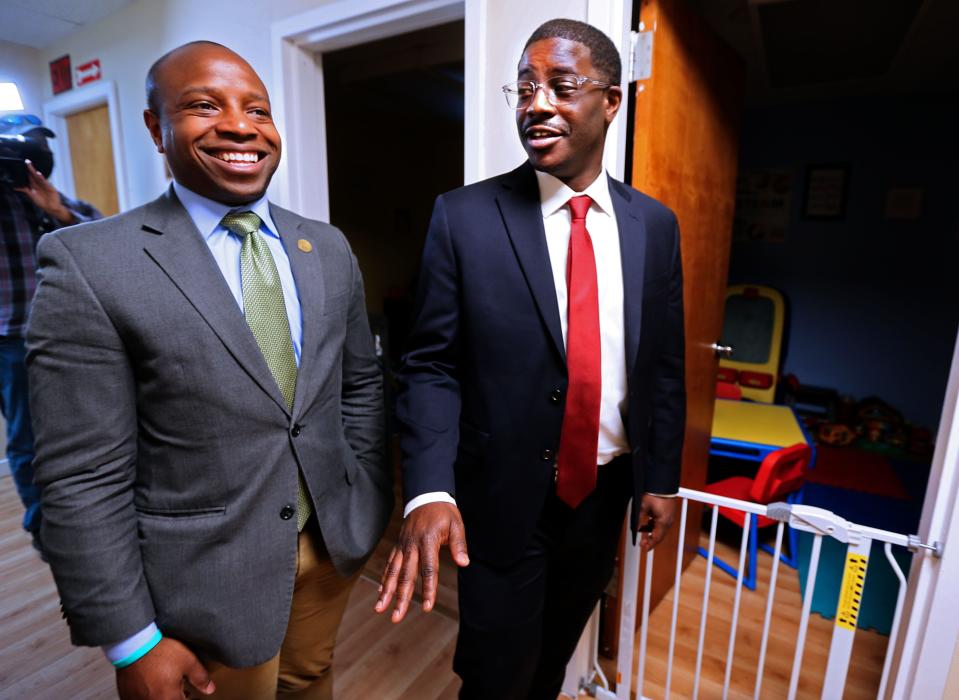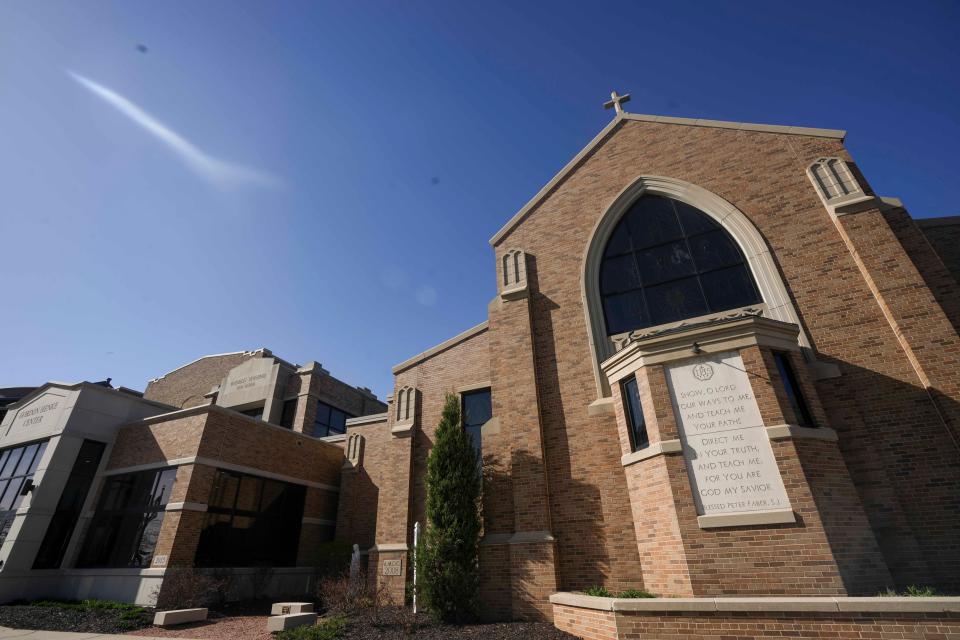Bice: Who won this legislative session? Gov. Tony Evers did with novel vetoes.
- Oops!Something went wrong.Please try again later.
- Oops!Something went wrong.Please try again later.
We have winners and losers each legislative session.
This year we have a win for the centuries.
Four centuries, to be exact.
Gov. Tony Evers submitted his budget plan earlier this year, and the Republican-controlled Legislature quickly tossed it. GOP lawmakers then drafted their own budget bill and negotiated the details with Evers and his team.

Everything seemed to go smoothly, and cooperatively, until the plan got to Evers' desk. A master of the veto pen, Evers sliced and diced the proposal, making 51 changes.
One edit stood out.
Most notably, the second-term Democratic governor struck a hyphen, merged a couple of numbers and — voila! — extended the annual $325 per-student increase for public schools from two years to four centuries.

Yes, 400 years. America, by comparison, is not even 250 years old.
No need to negotiate with Republicans now.
Since the line-item veto was approved in 1930, Wisconsin governors have created Frankenstein vetoes, revenue reduction vetoes and Vanna White vetoes. Call this the Star Trek veto. Evers took the budget where no governor had ever gone before.
(OK, former Gov. Scott Walker issued a veto in 2017 that denied schools the ability to save money through energy efficiency without a referendum for 1,000 years. But that had little impact then and now.)
The reaction to Evers' veto was swift and divided.
The lefty New Republic called the veto "historic" and "brilliant." Others labeled it "creative" and "crafty." Dems said it was a pro-eduction move.
Republicans called the veto "irresponsible," which it clearly was. No one knows what's going on in 10 years, much less 400. One GOP lawmaker was reduced to cursing. Another accused Evers of "single-handedly, choosing to exorbitantly raise taxes on you, your children, your grandchildren, your great grandchildren," etc.
Even "Jeopardy!" host Ken Jennings got in on the act.
Assembly Majority Leader Tyler August concluded: "It will be difficult, if not impossible, to ever negotiate with this governor again in the future.”
Like Evers, perhaps in his last term, cares. Liberals control the Supreme Court. Republicans lack a veto-proof majority in the Legislature. He is still the governor.
Indeed, as we just found out, the one with the veto pen usually wins. And this was one for the history books.
Here are your other winners and losers during the recent legislative term:
Loser: Assembly Speaker Robin Vos

For most of the session, things went swimmingly for the Rochester Republican. But, again, Evers' vetoes undercut much of Vos' work.
The governor protected the 188 positions within the University of Wisconsin System focused on diversity, equity and inclusion (DEI) programs, a point of emphasis for Vos. Evers eliminated a tax break for people in the top two income brackets, prompting a rebuke from the Assembly leader.
And the Democratic chief executive trimmed a $10 million grant for VISIT Milwaukee, the city's tourism bureau, that could have gone for the Republican National Convention next year. Evers left in place $1 million for VISIT Milwaukee and moved $9 million into the state Department of Tourism's budget for marketing.
Vos has said he's happy where he is leading the Assembly, but by this point, the guy must be getting veto pen envy.
Winner: Milwaukee County Executive David Crowley and Milwaukee Mayor Cavalier Johnson

Faced with dual fiscal cliffs, Crowley and Johnson held their breath and agreed on a single, unified plan:
Trust Evers and the Republican legislators to work together to pass a bill allowing sales tax increases of 0.4% in Milwaukee County and 2% in the city. It was a risky move, but it worked.
The final deal came with GOP strings attached. The law prevents the city from using tax dollars on DEI programs, for instance. It also says Milwaukee can't use tax dollars or tax incremental financing districts on the streetcar, called The Hop.
One insider cited Crowley's work in particular. "He did a great job here," said the Democrat.
But believe it or not, the biggest hurdle might still be ahead. Crowley will have to convince two-thirds of Milwaukee Board of Supervisors and Johnson two-thirds of the Common Council to approve what many supervisors and council members consider a regressive tax.
For Johnson and Crowley, there's no other option.
Loser: University of Wisconsin System

There seems to be a big disconnect between the leaders of the UW System and the Republicans who run the Assembly and Senate.
Despite a huge budget surplus, GOP lawmakers decided to slash the UW budget by $32 million. (The money has been put in a fund that UW can access if the Joint Finance Committee approves.)
The Joint Finance Committee also axed a proposed $347 million new engineering building at UW-Madison from its $2.4 billion spending plan for state building projects. The new building would allow the state flagship campus to graduate at least 1,000 more undergraduate engineers annually.
The project was the UW System's No. 1 capital priority in this budget. It was a top priority in the last budget, too.
So what's going on? It's not exactly clear, but UW-Madison maybe should have thought twice before inviting former U.S. Attorney Eric Holder to be its spring commencement speaker while the budget was pending. Holder served under Democratic President Barack Obama and has led numerous voter drives in Wisconsin.
Winner: Charter and choice schools

Evers angered a number of his public school supporters, including the state teachers union, by signing a funding package that significantly boosted funding for private choice and independent charter schools.
The measure included a $1 billion increase in state aid to public K-12 schools, raising the per-pupil aid by $325 annually. But Evers' critics focused on the fact the new law provided the biggest hikes in choice and charter funding ever. For instance, the annual voucher payments for high school students will jump from $9,045 in 2022-23 to $12,765 in 2024-25 — a 41% increase.
This school year, about 29,000 students got vouchers for the Milwaukee program, 4,000 for the Racine program, and 17,000 in the statewide program.
"We lost our education governor," claimed one prominent Democrat.
Evers initially downplayed the criticism.
"What people forget is every time we have a budget for public schools, our money for charters or for vouchers goes up, too," Evers said.
Then he extended the boost in spending for public schools by 400 years via his veto pen. (See above.)
"Maybe the creative veto on the school levy was a way to make it up to the education community after signing the largest increases in charter and choice funding in history," speculated one Republican lobbyist.
Without a doubt.
Loser: Milwaukee Brewers

We haven't reached extra innings, but it's getting closer.
Evers initially proposed this year that the state provide the Milwaukee Brewers with $290 million in funding to get the team to stay at American Family Field until 2043. The current lease runs out in 2030.
Republicans ditched that plan, and most recently, a bipartisan group of legislative leaders was looking at a new proposal that would provide the Brewers with annual payments for the next 27 years instead of the lump sum of $290 million. Vos has also suggested the City of Milwaukee and Milwaukee County should chip in some cash to help with the funding plan, despite their financial problems and opposition.
Whatever the final deal, it will probably require both Republican and Democratic votes to pass it.
And soon.
Winner: Milwaukee Police Association
Is there any special interest that does its work in Madison more effectively than the Milwaukee police union?
More than a decade ago, the union fought successfully for then-Gov. Scott Walker and the Legislature to exempt firefighter and police unions from Act 10, the measure cracking down on public employee unions. Then the Milwaukee police union convinced lawmakers to overturn the law requiring them to live within the city limits.
Now the union got a basketful of goodies in the law permitting the City of Milwaukee and Milwaukee County to boost their sales tax.
The legislation strips much of the power from the city Fire and Police Commission, the civilian board with oversight responsibilities over the police and fire departments. Milwaukee Public Schools must have at least 25 school resource officers in its schools by Jan. 1, 2024.
The city also maintains the number of police officers minimally at the numbers from the previous year, excluding any who are in state- or grant-funded positions. Ten years after the sales tax takes effect, Milwaukee would have to have at least 1,725 officers, including 175 detectives.
There were currently 1,630 budgeted sworn positions in the Milwaukee Police Department, and 1,560 were filled.
Defund the police? Not as long as the Milwaukee Police Association is on duty.
Contact Daniel Bice at (414) 313-6684 or dbice@jrn.com. Follow him on Twitter @DanielBice or on Facebook at fb.me/daniel.bice.
THANK YOU: Subscribers' support makes this work possible. Help us share the knowledge by buying a gift subscription.
DOWNLOAD THE APP: Get the latest news, sports and more
This article originally appeared on Milwaukee Journal Sentinel: Who won the Wisconsin legislative session? Tony Evers did with a veto.

